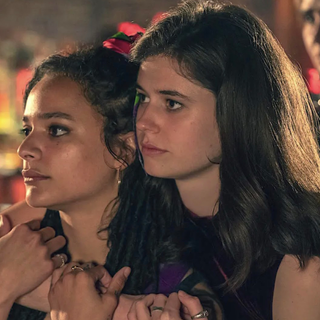‘Conversations with Friends’: A Review
- Morgan Forbes
- Jun 1, 2022
- 3 min read
Updated: Jun 10, 2022
4 / 5 stars.
After the popular adaptation of Sally Rooney’s book Normal People, the miniseries Conversations with Friends (the author’s debut novel) had a lot to live up to. The Hulu and BBC productions bring to life stories that already share striking similarities — a moody Irish setting, intimate explorations of emotionally-stunted relationships, and a personal lean towards communism as a casual discussion point. Female lead Frances (played by Alison Oliver) navigates a friendship with ex-girlfriend Bobbi (Sasha Lane) as they become involved with an older married couple, with Frances’ gravitating towards the quiet and socially-awkward Nick (Joe Alwyn) as her pick for a secret affair. While the book is generally regarded by fans as Rooney’s best work, it’s plain to see the poor impression its screen adaptation has given viewers and critics alike. What exactly do they feel has contributed to the show’s flop? And, in my obviously unpopular opinion, what redeeming qualities led me to rate it so favourably?
At an overall glance, the critics have been especially brutal in their takes. With a quick Google search of the title, the following headlines appear: ‘In Conversations With Friends, Everyone’s Insufferable’ (Refinery29), ‘The frustrating awkwardness of a much-hyped series’ and ‘TV so slow it must be trolling us’ (The Guardian). Citing a gruelling pace split across twelve episodes and characters with almost inexcusable flaws, the reviews often relay back to Normal People as a jarring comparison. Rooney’s stories have always been driven by characters over plot. But while Normal People’s coming-of-age romance showcased touching and realistic displays of intimacy between its main characters, many felt that the same naturalistic attempts made in Conversations with Friends fell flat. And as the story revolves around four complicated individuals — tied together as a mix of friends, partners, and ex-lovers — it is harder to route for any particular relationship to go a certain way.
Furthermore, Sally Rooney is beginning to fall prey to stereotypes: you can always trust her next big hit will follow a group of quirky, misunderstood millennials discussing outrageous political ideologies over dinner in a European holiday home. For some, the repetitive nature of her work is a comforting familiarity; for others, there is only so much mumbling dialogue and pining stares you can bear to witness between the recurring tropes of angsty, intelligent twenty-somethings. Rooney cannot be blamed for following such strict formulas in her writing when there are already such high levels of expectation and popularity associated with her name. However, Conversations with Friends brings an element of surprise particularly with its ending (granted, it’s not an ending everyone would endorse).
On the other hand, Conversations with Friends has done an excellent job of bringing several issues to light. It’s only recently that mainstream TV shows have begun to showcase sexualities on a spectrum, rather than resorting to strict hetero- or homosexual orientations. The show can be praised for a refreshingly casual display of LGBT+ relationships, with lead Frances’ bisexuality dodging stereotypes (a dramatic coming out story is replaced with a more tentative exploration of romance across genders — a rarity with a cast so young). There is also a certain dissection of monogamy which is to this day a topic of taboo in the media. Additionally, the mental health struggles of men are not treated as non-committal background noise.
On another note, we see the portrayal of an important issue many women feel alienated about: the at times horrifying nature of periods and, in particular, endometriosis. The long-term condition is incurable and estimated to affect between two and ten per cent of women, and in this fictional world includes Frances. Frances navigates a diagnosis after relentless suffering she tends to brush off, which at one point lands her in A&E. A harrowing conversation with a doctor reveals all she can hope for is pain management, and she learns she may struggle to have children. As sore as this display feels, the level of relatability is appreciated by many viewers with similar struggles.
Lastly, the story itself. While some called it boring, the slow-burn element of the series makes for an in-depth exploration of emotion without cramming in action where it isn’t warranted. There is a certain beauty that accompanies such a careful treatment of plot, and it ensures the build-up to the more climactic moments isn’t too rushed. The viewer can become fully immersed into a modern universe of unlikely yet absorbing relationships without getting distracted by an overwhelming storyline. And finally, despite everything else, the show is incredibly easy to binge-watch.
Figure 1: Frances hugging best friend Bobbi, TVLine.





Comments